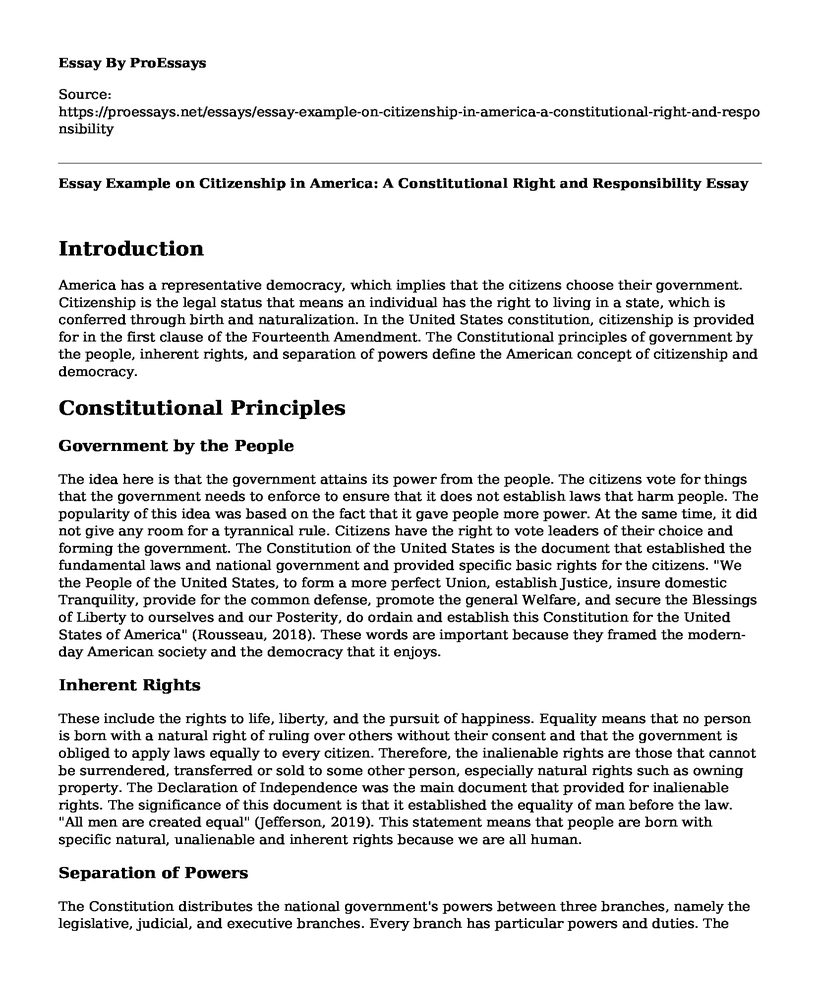Introduction
America has a representative democracy, which implies that the citizens choose their government. Citizenship is the legal status that means an individual has the right to living in a state, which is conferred through birth and naturalization. In the United States constitution, citizenship is provided for in the first clause of the Fourteenth Amendment. The Constitutional principles of government by the people, inherent rights, and separation of powers define the American concept of citizenship and democracy.
Constitutional Principles
Government by the People
The idea here is that the government attains its power from the people. The citizens vote for things that the government needs to enforce to ensure that it does not establish laws that harm people. The popularity of this idea was based on the fact that it gave people more power. At the same time, it did not give any room for a tyrannical rule. Citizens have the right to vote leaders of their choice and forming the government. The Constitution of the United States is the document that established the fundamental laws and national government and provided specific basic rights for the citizens. "We the People of the United States, to form a more perfect Union, establish Justice, insure domestic Tranquility, provide for the common defense, promote the general Welfare, and secure the Blessings of Liberty to ourselves and our Posterity, do ordain and establish this Constitution for the United States of America" (Rousseau, 2018). These words are important because they framed the modern-day American society and the democracy that it enjoys.
Inherent Rights
These include the rights to life, liberty, and the pursuit of happiness. Equality means that no person is born with a natural right of ruling over others without their consent and that the government is obliged to apply laws equally to every citizen. Therefore, the inalienable rights are those that cannot be surrendered, transferred or sold to some other person, especially natural rights such as owning property. The Declaration of Independence was the main document that provided for inalienable rights. The significance of this document is that it established the equality of man before the law. "All men are created equal" (Jefferson, 2019). This statement means that people are born with specific natural, unalienable and inherent rights because we are all human.
Separation of Powers
The Constitution distributes the national government's powers between three branches, namely the legislative, judicial, and executive branches. Every branch has particular powers and duties. The constitution framers focused on creating a stronger government for America. At the same time, they wanted to restrict the government's powers. Limiting the powers of the government was the main objective of the separation of powers (Bradley, & Siegel, 2016). The separation of powers is the brainchild of Montesquieu in the document "The Spirit of the Laws," where he sought to outline the duties of the branches of the government. The importance of this document is that it has laid down the duties and responsibilities of each branch of the government. "A dependence on the people is, no doubt, the primary control on the government; but experience has taught mankind the necessity of auxiliary precautions." The approach is to ensure there are no violations of the rights of any form of government and that the citizens are well-taken care.
Conclusion
American citizenship and democracy are governed by the three basic constitutional principles of separation of powers, the government of the people, and inherent rights. Through the separation of powers, the constitution framers focused on creating a stronger government for America. On the same note, the inalienable rights are those that cannot be surrendered, transferred, or sold to some other person, especially natural rights such as owning property. Finally, a government of the people ensures citizenship participation in the government through voting.
References
Bradley, C. A., & Siegel, N. S. (2016). Historical Gloss, Constitutional Conventions, and the Judicial Separation of Powers. Geo. LJ, 105, 255. https://scholarship.law.duke.edu/cgi/viewcontent.cgi?article=6263&context=faculty_scholarship
Jefferson, T. (2019). The declaration of independence. Verso. https://www.files.ethz.ch/isn/125499/5024_Jefferson_Declaration_of_Independence.pdf
Rousseau, J. J. (2018). Rousseau: The Social Contract and other later political writings. Cambridge University Press. https://www.files.ethz.ch/isn/125478/5015_Rousseau_The_State_of_War.pdf
Cite this page
Essay Example on Citizenship in America: A Constitutional Right and Responsibility. (2023, Apr 09). Retrieved from https://proessays.net/essays/essay-example-on-citizenship-in-america-a-constitutional-right-and-responsibility
If you are the original author of this essay and no longer wish to have it published on the ProEssays website, please click below to request its removal:
- Essay Example on Gun Control Policies
- Thakkar's Image in Africa Essay
- Fraud and White-Collar Crime Paper Example
- Human Freedom: Enhancing and Limiting Factors - Essay Sample
- Research Paper on Surveillance Studies: Examining Power and Social Control Through Technology
- Essay Example on Border Patrol: Challenges of Protecting Borders in Crisis
- Paper Example on Celebrating Freedom: Remembering the 4th of July in the US







